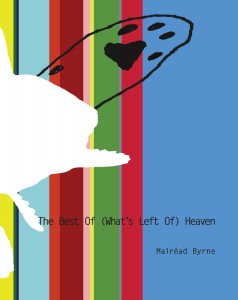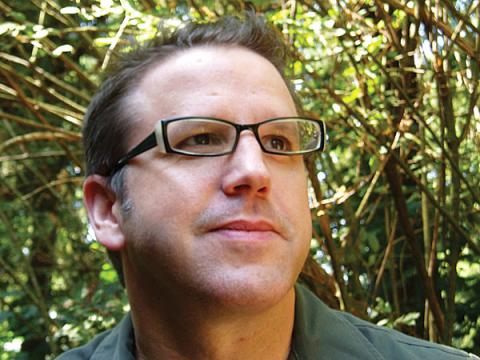Live Giant! Dorothea Lasky Reads Live From Philly!
You missed the live reading but you can still buy Dottie’s books!
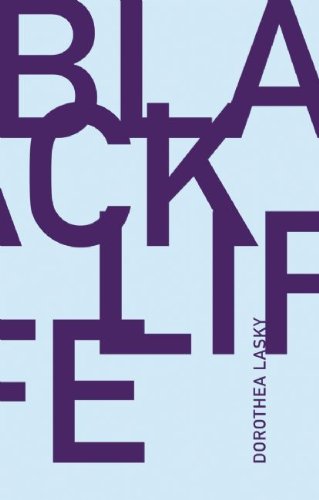
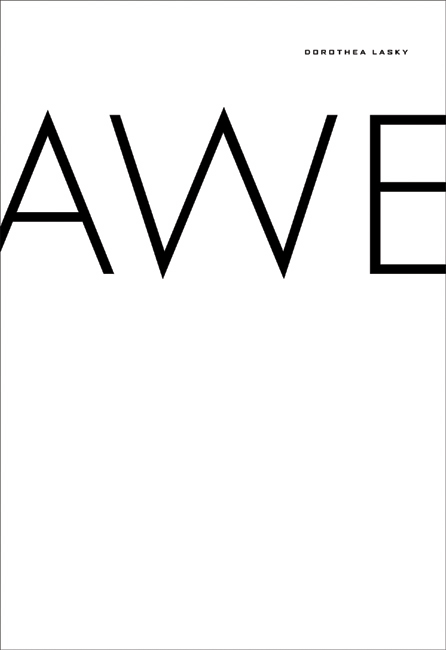
Through midnight tonight, Wave Books has kindly offered half price copies of Dorothea’s fantastic first book AWE (the $7 price will run through midnight, so go now!). Black Life will be released April 1st!
In the meantime, don’t forget to check out the 2010 Wave Books Package, which includes everything Wave will be putting out this year (a package of magic), including Black Life, Mary Ruefle, Michael Earl Craig, a reissue of CA Conrad’s The Book of Frank, and tons more.
The Best of (What’s Left of) Heaven
Mairéad Byrne made a survey. I took it. Is it scientific research? Is it a poem? Is it a joke? Is it about couches? Or comfort or people? She wrote a poem in 2006 called “The Good News” that says, like, “The cross between a poem & a carrot is a poem./The cross between a poem & a forklift truck is a poem” — so I guess the survey is a poem. I like to think of it that way as much as I like to think of it as research or a joke. READ MORE >
An Interview with Zachary German
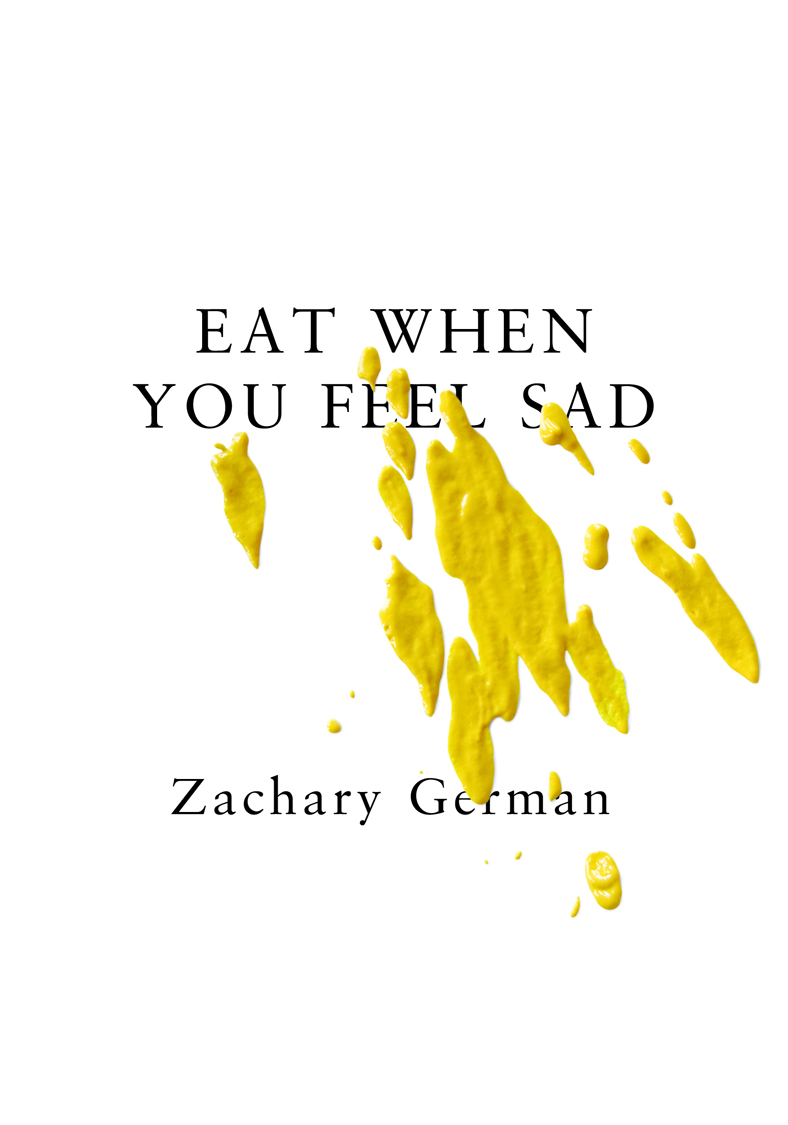
The first time I met Zachary German was at a restaurant where they had noodles and beer. Zach had thick glasses and would be quiet a long time and then suddenly start asking a lot of short questions. He has big eyes sometimes. Later, a bunch of people walked to an apartment and Zach smoked a pipe and when we got there he went and bought several 40s and we talked about rap.
This was right before Zach’s Bear Parade ebook version of Eat When You Feel Sad came out. Reading EWYFS in this form I remember feeling both confused and intrigued, the blankness of it, and the feeling behind the blankness that I couldn’t name, and why I wanted to keep looking at it. Zach’s is surely a voice unlike most any other for this way of its small, selected observations, the rendering of time and space in direct, neutral seconds, which somehow in cohesion form a center you could not have labeled in another way.
Last month Melville House Publishing released the full version of Eat When You Feel Sad, a novel, which takes off from the place the original excerpt began and develops that indirect interiority even beyond what I’d expected in the first taste. Herein, Zach offers an answer for one of the bitchiest matters in books: How to deliver presence or “heart” without sounding predictable or like a dolt. It’s truly a refreshing and oddly powerful collage of moments, music, staring, speaking, eating, boredom. This is a new thing, an odd object that somehow opens great feeling in its calm.
Over email I talked with Zach about the book’s creation, his manners of selection, minimalism, his humor influences, bedtime, revision, and so on.
4 Lick-n-Catch
1.) New Diagram 10.1. It be sick like light socket soup. Go stain yourself.
2.) Russia glow will dig Moscow & St. Petersburg 1900 to 1920: Art, Life and Culture in Russia’s Silver Age and this Bookslut interview.
3.) What book speckles/sighs the floorboard of your car right now? I have a copy of Hayden’s Ferry, a Gary Lutz, and a 2009 Best Magazine Writing. The Lutz has a snow/melt coffee stain on its cover and I haven’t even spatulaed the book yet. Oh well. Won’t hurt the sentence none.
4.) The Cows
httpv://www.youtube.com/watch?v=q8SsY3AFdBU
Kevin Sampsell Week (5): Unedited Cover
 The original cover for A Common Pornography included “Hank,” a harness compatible silicone flesh-tone (Caucasian, wtf!) dildo resting in its intended vector on a retro 70s wool lounge chair. Sampsell, who gave up minimalism when they said “negate the wieners,” propagated his living quarters with various intra-orifice objects, though he prefers to name them after country singers. “Johnny Cash,” a real doll who looks strikingly like, well, Johnny Cash, is not pictured, but lies supine on the floor outside of the camera’s frame. Thanks to Sampsell, Cash’s plastic sphincter is now a “ring of fire.” Jonathan Ames, as his blurb will tell you, calls the book “heartbreaking”; what he fails to mention is that the heart is not the only thing being broken — so if Sampsell should sit down with a grimace for his next interview, please note that it is not any qualms of the mind which cause such facial strain, but rather tribulations of a more bodily, self-inflicted sort.
The original cover for A Common Pornography included “Hank,” a harness compatible silicone flesh-tone (Caucasian, wtf!) dildo resting in its intended vector on a retro 70s wool lounge chair. Sampsell, who gave up minimalism when they said “negate the wieners,” propagated his living quarters with various intra-orifice objects, though he prefers to name them after country singers. “Johnny Cash,” a real doll who looks strikingly like, well, Johnny Cash, is not pictured, but lies supine on the floor outside of the camera’s frame. Thanks to Sampsell, Cash’s plastic sphincter is now a “ring of fire.” Jonathan Ames, as his blurb will tell you, calls the book “heartbreaking”; what he fails to mention is that the heart is not the only thing being broken — so if Sampsell should sit down with a grimace for his next interview, please note that it is not any qualms of the mind which cause such facial strain, but rather tribulations of a more bodily, self-inflicted sort.
Let’s All Love Molly Young

In fact, some of us already do. I know I have linked/mentioned her before, but it feels like this is the right time to make things official, and so I invite everyone to join me in declaring our Official Love of Molly Young. But just what is it that we love? Well…
Here she is at the Poetry Foundation (thanks for the link, Travis), writing on Frederick Seidel.
Like that of Miller and Bukowski, Seidel’s style is one of incriminating self-exposure coupled with an exacting (and therefore imitable) aesthetic. But here’s a funny thing. Writing a poem about lust, pride, imprudence—about ordering a call girl or staying at “literally the most expensive hotel in the world” or racing a bike at 200 mph—has a way of neutralizing the unpleasantness of that vice. To write a good poem about an ugly thing, as Seidel does often, is not to write an ugly poem.
And on Richard Holmes’s The Age of Wonder.
Romanticism as a cultural force, Holmes points out, is generally regarded as “hostile to science, its ideal of subjectivity eternally opposed to that of scientific objectivity.” Yet both pursuits followed the same imaginative principles and notions of wonder that fueled their advancements, and it is Holmes’s contention that a Romantic science exists in the same sense as a Romantic poetry, and both flourished during what he calls the Age of Wonder.
You can also find her all over This Recording, and n+1 (including “Kickstart my Heart,” the adderall in the Ivys piece, and a more recent double-review of Playboy: The Complete Centerfolds and a Hefner biography) and she tumbles! And she collaborates on art books. The new one is called TROUBLESHOOTING . It also says she blogs for Urban Outfitters, but I didn’t actually click that one. Instead I clicked on “Rules on Writing” at More Intelligent Life. And now I know the rule: which is there is no rule, which is just what I’d always hoped. Molly!
Kevin Sampsell Week (4): A Common Interview by Michael Kimball
Kevin Sampsell lives in Portland, Oregon and works at Powell’s Books. He started the press, Future Tense Books, in 1990 and has published many writers including Mike Topp, Zoe Trope, Chelsea Martin, Susannah Breslin, Elizabeth Ellen, and Claudia Smith. His own books include Portland Noir (as editor), Creamy Bullets, and A Common Pornography. Harper’s Magazine says, “Sampsell’s talent for observing the ordinary….is perhaps best displayed in chronicling the cringing inelegance of adolescent sexuality: the embarrassing hookups, the acne-cream-flavored kisses, the obsession with pornography, and the preoccupation with discarding one’s virginity.” And Jonathan Ames says, “This is the kind of book where you want to thank the author for helping you feel less alone with being alive.”
Michael Kimball: One of the most striking things about A Common Pornography is the way you lay yourself bare on the page. There are so many awkward, funny, difficult, honest, and maybe embarrassing episodes in the book. How did you get to a place where you were able to do that and what was your mindset as you approached each episode (maybe especially as compared to your mindset writing fiction)?
Kevin Sampsell: It’s mainly a matter of time going by. I’m 42 now. You just get to the point where you don’t really care if other people are bothered or feel uncomfortable with whatever you’re writing. I always think it’s weird when people say, ‘I didn’t like this book because it was so depressing or so dirty.’ I don’t think an author should treat readers like children, or like they have to protect the reader. Personally though, it was hard sometimes to let go of some of these things that I didn’t tell anyone about. I didn’t even tell my girlfriend, now my fiancé, about the prostitute stuff until a couple of years ago. The dilemma I think most writers have is that they don’t care about embarrassing themselves but they do worry about how their family or co-workers or lovers will react.
Compared to fiction, it’s maybe a little harder. At least with fiction you can say to your mom or whomever, ‘Oh, I just made that up.’
Back Flash: Margaret Atwood
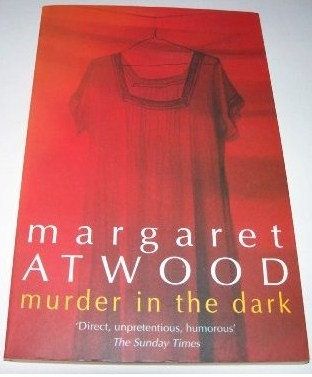 –like she’s pretending to write a story but really examining plot, the art, the control, all that writer shit. It’s like a trick and a lesion.
–like she’s pretending to write a story but really examining plot, the art, the control, all that writer shit. It’s like a trick and a lesion.
–Yes, I know. But it’s a book I’m saying, not just that story.
–Well, people only know that plot story. It’s a trick, you know, meta, but a legion, sort of supposed to teach you—like with Buddha, a Kola. You could use it in class plenty.
–You mean a Koan.
–Yeh, a colon. A story not about the story. Sharp as a cat’s eye. Lorrie Moore did it and then Grace Paley, too.
–No, no, you’re off-focus. Forget the plot picking. I’m saying it’s a book. Atwood did a whole flash book. It goes out of print because so many people think flash fiction is the lining of a diseased lung. Well, it was coughed up and won the Booker. I don’t know how these things work.
–You mean Fletch?
–No, no, phlegm, not Fletch. Just read the book, if you can find it.

